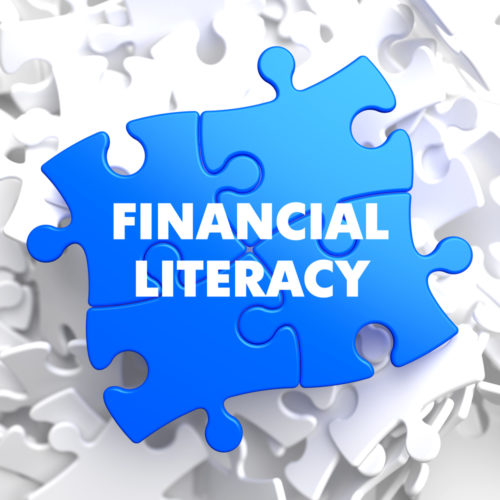Lacking in financial literacy can hinder a person’s ability to make good financial decisions. Not having the knowledge to carry out your basic financial tasks can create bigger financial problems. For example, not budgeting properly can lead to late or unpaid bills which could negatively affect your credit score and hurt your chances of qualifying for a mortgage or car loan in the future.
Standard & Poor’s Global Financial Literacy Survey found that economies with a high amount of financially knowledgeable citizens are the wealthiest. An incomplete knowledge of basic finance concepts can lead to a poverty cycle that’s hard to break. Fortunately, there are many simple ways you can improve your financial literacy to make better financial decisions for yourself and your loved ones.
Table of Contents
Financial Literacy Definition
The term “literacy” is often used to describe someone’s ability to read. In the case of financial literacy, it refers to the extent to which someone knows how to handle money. Financial literacy is the understanding of how money works — how it’s made, spent, and saved.
Basic financial literacy is a skill anyone of nearly any age can learn. It’s empowering because having knowledge of how money works can help people become self-sufficient to meet their financial goals. Financial literacy is the foundation an individual needs to manage their daily life and make good financial decisions for the future.
Financial literacy can also reduce the risk of fraud. When a person has a good understanding of basic money concepts, those who seek to exploit them will have trouble doing so.
Major Concepts in Financial Literacy
It’s never too late to improve your knowledge about money and finances and adopt good financial habits. The following are some of the most important financial literacy concepts to know.
Budget
A budget is a spending plan and the most important first step in your financial literacy journey. Everyone can benefit from a budget — it accounts for how much you make and how much you spend. With a working budget, you have a good idea of where your money is going and whether you’re earning enough to cover all your bills. Not having a budget can cause you to overspend on the wrong things, which may result in a lack of funds to cover your basic living expenses.
To create a basic monthly budget, divide a sheet of paper into two columns. On the left side, list and add up all your monthly income. On the right, list all your expenses and add them up. Subtract your expenses from your income.
If you have money left over, you’re off to a good start. Consider setting up a savings account to put money away every month towards an emergency fund. If you don’t make enough money to cover all your expenses, it’s time to cut out some of your expenses on the list and/or find a side job to bring in extra money. Refer to your budget regularly to get an idea of your financial health and to adapt your budget to your life changes.
Bank Accounts
Bank accounts provide a safe place to keep your money and simplify your life. Many come with online bill pay and the ability to schedule payments so you don’t forget to pay a bill by the due date. Banks will pay you a small amount of interest on the money you keep in savings, so your funds grow over time. There are different ways to keep your money in the bank:
- Checking account: Allows deposits and withdrawals for paying bills;
- Savings account: Withdrawals are limited, you can put money away for the future and earn a small amount of interest on the money you save;
- Money market account: Similar to a savings account, but normally earns more interest than a savings account;
- Certificates of deposit (CDs): A savings account where you can’t access your funds for a set period of time such as three or six months, but you’ll earn higher interest;
- Investment retirement accounts (IRAs): Similar to a savings account but it can’t be accessed until you retire and has special tax-saving benefits;
Credit and Debit Cards
Once you feel comfortable managing a budget and paying your bills on time, consider expanding on your financial literacy journey by using credit. Debit cards are a good start, since they’re linked to your checking account. Debit card purchases are limited to the amount of money you have in the account, so you can’t spend more than you have available. Nevertheless, be responsible with your spending — charging a plastic card for items is less painful than handing cash over, potentially leading to overspending.
Credit cards are the next step. A credit card requires you to have a fair credit history or higher. A card issuer will give you a credit limit, which is the amount you’re allowed to spend on the card, and expect you to pay back the amount you charged.
There is potential for trouble here. You can pay off your full balance with no fees before the due date or you can choose to make smaller payments and pay a monthly interest charge for doing so. Not paying enough towards your balance can be very expensive — many cards charge more than 20% in interest. Taking the slow repayment route could take years and cost you more than double what you spent in the first place.
Credit cards provide the best and worst lessons on personal finance. Make good choices and you will boost your credit and benefit from credit card perks. Make poor choices and it will negatively affect your credit score and cause you to spend more than you bargained for.
Debt
Debt is the amount of money you owe. It impacts how much you can spend. Avoiding debt seems simple — don’t spend more than you have. But life could throw a wrench in your plans and an emergency such as an accident or illness may turn out to be an expensive experience.
To lower the risk of debt, be careful with your spending and follow your budget. Save money every month towards an emergency fund. Take action to pay down the debt by eliminating as many expenses as possible to put the money towards your debt payments.
Credit
Credit can be defined as how much a lender trusts you to pay them back. They determine this based on your payment history, which is reported to a credit bureau, who awards you with a credit score. The higher your credit score, the lower the risk to the lender that you won’t pay them back on the money they lend you.
Credit can affect more aspects of your life than you think. Landlords, utility companies and even your car insurer will check your credit. A poor credit score limits what you’re able to borrow money for or makes borrowing more expensive. If you wish to buy a car or borrow money to buy a home, you’ll need good credit. Protect your credit by paying your bills on time and being careful with how much you spend.
Loans
A loan is an amount you borrow from a bank or lender that you have to pay back, with interest, within a certain period of time. To qualify for a loan, you’ll need good credit and a job to show the lender you will pay the loan back. The most common types of loans are:
- Student loans to pay for a college education;
- Auto loans so you can buy a car, with loan terms that typically last two to seven years;
- Mortgage loans, which typically last for 15 to 30 years to pay back the cost of your purchased home;
Real Estate
Owning a home or other real estate is one of the most popular forms of investing your money. In most cases, the property you buy today may be worth more in the future. There are tax advantages to owning property — you can deduct certain expenses on your tax return including insurance and interest when you file your taxes.
You’ll need good credit and a down payment to buy a home or property. Aim to save at least 20% as a down payment towards your home or property — doing so will save you from having to pay for monthly private mortgage insurance.
Owning real estate may also be a good retirement investment since you can earn income from renting your property. Purchasing a home while you’re younger may mean the home is paid off by the time you’re set to retire so you don’t have to worry about a housing payment.
Investment
Investing means using your money to earn extra profit. When you put your money in a savings account, there is no risk. Therefore, the amount you will earn in interest is very small. Investments carry higher risks and potentially higher earnings, although it’s also possible to lose all your money on investments, such as in the stock market. Common forms of investment are:
- Stocks: Buying shares in a company, most risky;
- Bonds: Buying company or municipal debt, less risky than stocks;
- Annuities: A long-term investment through your insurance company, less risky than stocks;
Retirement
Saving for retirement is important because it’s likely you won’t be able to work in your later years. The key to saving for retirement is to start early and save consistently. Some ways to plan for retirement include:
- Contribute to a 401(k): A 401(k) is a retirement savings account sponsored by your employer; in some 401(k)s, your employer matches the contributions you make;
- Open an IRA: Open and save money for retirement using an IRA account, which provides tax benefits;
- Pay off all your debt: Try to pay off all your debts and obligations before retirement so your limited retirement income isn’t spent on debt;
How to Improve Your Financial Literacy
The first step of improving financial literacy is to grow your knowledge of financial concepts. Financial literacy is a lifelong education — stay curious, continue learning about personal finance, and pass your knowledge on to your kids and grandkids. The next step is to apply what you’ve learned to your own finances for the sake of improving them. Take your knowledge to the next level by creating and following a financial plan.
Build a Financial Plan
Put together a life assessment of what you own, what you owe, and what big-picture goals you have for the future. This goes beyond your budget for your daily expenses. A financial plan helps you decide what lifestyle changes you need to make to achieve your financial goals.
Include plans for the future, such as paying for your children’s’ college education, contributing to your retirement, and creating a will and estate plan. Changes to your financial habits may need to be incremental because investing can be about short-term goals, such as saving to buy a home, or long-term goals, such as saving towards retirement.
Assess Your Current Financial Situation
After putting together a financial plan, it’s time to evaluate it. Determine where there is room for improvement and think of how you can make the improvements happen. Some ways you can make lasting financial changes that benefit both you and your loved ones include:
- Budget more for savings and retirement and less for frivolous spending on regularly eating out;
- Consult with an investment professional to build an investment portfolio that best meets your savings and investment goals;
- Continue your financial literacy journey by keeping up to date on financial news that interests you.
Cultivating financial literacy is your ticket to a life of minimal money problems and maximum success with your financial goals.
Image Source: https://depositphotos.com/





